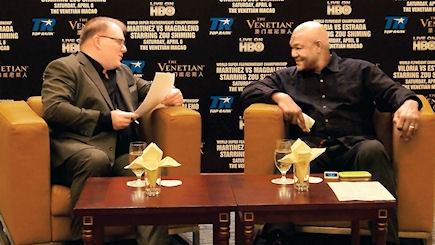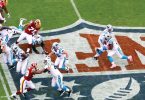This article first appeared in the May/Jun 2013 issue of World Gaming magazine.

Few people have enjoyed such remarkable success in their life as the multi-talented George Foreman. From humble beginnings in Texas, Foreman went on to win boxing gold at the 1968 Olympics and the World Heavyweight Championship in 1973 before retiring in 1977, becoming an ordained minister, then coming out of retirement 10 years later to win the heavyweight belt again at the age of 45. To this day he remains the oldest Heavyweight Champion in history. Since then Foreman has struck gold in the business world, too, with his hugely successful George Foreman Grill. In Macau recently to provide expert commentary for Chinese boxer Zou Shiming’s debut professional fight, the 64-year-old took some time out to chat with our CEO Andrew W Scott about his amazing life.
Andrew W Scott: Mr George Foreman, it’s an absolute honor to meet you. You are a household name – Olympic gold medalist, two-time Heavyweight Champion of the World, an ordained Baptist minister and indeed an extremely successful entrepreneur. Thank you so much for speaking to the readers of World Gaming magazine. It’s an honor and privilege to interview you. I want to start by asking you a question from one of our readers, Joel Dizon. If you could start your life all over again but take only one of those four achievements I mentioned, which would it be?
George Foreman: You know, the happiest day I had as an athlete was winning that gold medal in Mexico City. I just didn’t know that dreams came true. If I could start all over and live in one moment, it would be winning that gold medal.
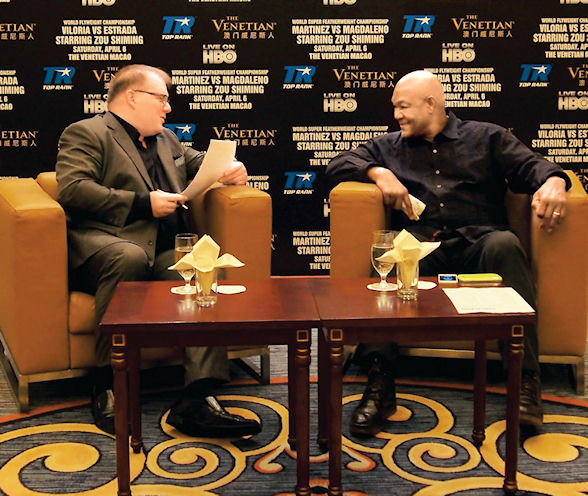
AWS: You basically fought under two personas as a fighter. You started as a quiet young man who appeared very focused but was not universally loved, then after your comeback you were loveable George and adored by everyone. Not many athletes get to experience both sides of the coin – the hero and the villain. What are the advantages and disadvantages to those contrasting scenarios?
GF: Well the splendor for me was the 10 years I had out of boxing. I was an Olympic gold medalist and heavyweight champion of the world, then had 10 years of being your average Joe. That’s when you really reflect on, “If I had to do it all over again, what would I do, how nice would I be to people, how much I would appreciate everything that has happened to me”. I had that advantage of 10 years out and then coming back. It made for a smarter guy than your average athlete. That’s probably how I dealt with everything, to understand who I am, where I am, what I have achieved, and appreciate every ounce of it.
AWS: Was it easier the first or second time? The first time you had youth and a little more fitness on your side but the second time you had more experience.
GF: The first time was like a whirlwind. Athletics, boxing … it just took me and whirled around and I just landed where I happened to land the first time. The second time around, I had to create the dust and the wind and the rain and do my own whirlwind. I knew exactly where I was going and I like the second time around because I planned my work and worked my plan.
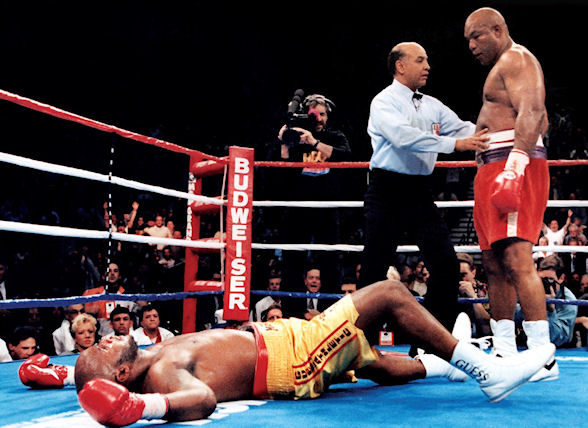
Foreman became the oldest World Heavyweight Champion in history when he knocked out Michael Moorer in 1994
AWS: Do you think anyone will be able to beat your age record of 45 for the oldest Heavyweight Champion in history?
GF: It’s not the record so much as will anyone be able to dedicate themselves? You know, when you get to 40 years old you just want to sit around and eat egg sandwiches or cheeseburgers! (laughs) It takes a lot of dedication to say to yourself, “Look, I’m not that old, I’m just as much an athlete as any young person”. At 45, and a heavyweight too, it’s a very difficult thing. But there will be lots of guys to break the record. Any time you have a record it just sits there for someone to break. I expect one day there will be a heavyweight champion of the world who is 65!
AWS: Really, 65?
GF: I expect that.
AWS: What makes you say that?
GF: Because the world gets better, the confidence is built. No one had confidence in themselves as an athlete when I was 45 years old. Actually 46 and 47 – I fought till I was 50. No one had that kind of confidence. But they looked at me and they said, “Hey, I can do that better than him”. Well, eventually they will do it better than me. And the age will move up, because the confidence level will move up.
AWS: I was going to ask you where you rank the gold medal you won in Mexico in 1968 in your list of achievements but you’ve already answered that. It is obviously a great highlight.
GF: Yes, when you are an 18-year-old boy and nothing has gone that well for you, all the years you haven’t achieved anything, then you don’t believe in dreams coming true. Then there I am on that platform, listening to my national anthem in the background and I’m thinking, “Oh, I hope I don’t wake up!” It was like a dream come true and I didn’t know dreams came true like that.
AWS: So when you became Heavyweight Champion of the world, did that also feel like a dream, or was it more planned?
GF: Well, actually I had a good manager the first time around, Dick Sadler, so he put me in the right place and all I had to do was be in good shape. I didn’t think I could beat Joe Frazier, of course. That was a shock to me. But other than that I expected the Heavyweight title. I just did not expect that Olympic gold medal.
AWS: Do you think the Manny Pacquiao vs Floyd Mayweather fight will ever take place and if it does, has it already lost its importance as the “super fight” we were all hoping it was going to be?
GF: I would love to see that Pacquiao/Mayweather fight. I think it is one of the best fights that could happen in the modern time. It hasn’t lost its luster, there is still a lot of gleam on it. These are two great fighters and the world still wants to see them box.
AWS: Do you think in today’s era of the sport anyone could have a 10-year absence and come back to regain the Heavyweight Championship?
GF: One thing about it, I had the 10 years off as a minister which means I didn’t discipline my body. I was in good shape. I would take these really long runs and of course I ate everything in sight. I was really physically reserved in fitness. I had a reserve there. And anyone can do it if they go like me. I have laid footsteps so someone can walk behind me and do it easier.
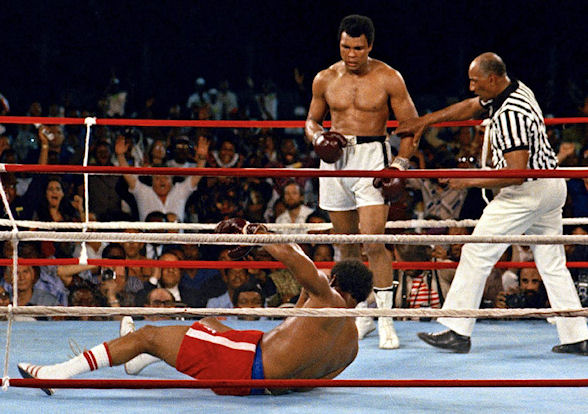
Foreman believes his loss to Muhammad Ali in their "Rumble in the Jungle" in 1974 was the only fight he genuinely lost
AWS: Do you think Mike Tyson will ever come back?
GF: He can come back of course to boxing but he’ll never be able to be menacing and he doesn’t have a long left jab so it would be really difficult for him. But I would like to see him try.
AWS: In Asia, our combat sports have tended to focus on martial arts and more recently MMA has had an impact. Do you think boxing can take off in China and the wider Asian region? What do we need to make boxing as popular as it is in the US?
GF: Well the only thing that benefits boxing are fans. You find a hero, you just let him put on a good show and I’m telling you boxing has made an impact right here in China. We have this Olympic gold medalist (Zou Shiming) right here in this region. Who can’t do it?
AWS: We interviewed him two days ago. He is a very humble man.
GF: It needs a star. Boxing doesn’t need any kind of skill, it just needs a star. Once you have found that celebrity, he makes boxing right here in Asia.
AWS: Can boxing ever be unified? We’ve got the WBA, WBC and all these different governing bodies. Can someone sort it out and just have one regulatory body or has the chance been lost?
GF: I think because everyone would like to see it, it will happen. Not to say it’s going to stay there, but to have everything unified at once, what a promoter’s dream.
AWS: Who could be the person to make that happen?
GF: It’s not who the person is, but who the boxers are. They have to be so popular. Pacquiao/Mayweather can unify one weight class then with the heavyweights find two popular guys and the world will demand that they fight. Popularity will be the glue.
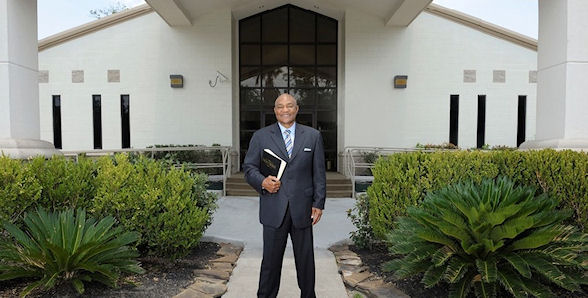
Foreman became an ordained Minister after his first retirement in 1977
AWS: Does Pay TV have too much control over boxing? Is there too much money involved in the sport through Pay TV and do they control it?
GF: I would rather the days when Pay TV is really involved than not. Remember I lived through the day when you had to go from city to city and you didn’t want to come back home because there was not enough money. You had to keep boxing on the road. I would fight sometimes three times per month trying to get enough money together to make certain my rent and my car loan were paid. We don’t want to go back to those days. I think the advent of pay television, pay-per-view, it’s beautiful. Let it not end, please!
AWS: Love him or hate him, Dana White, the President of the UFC, has ruled the sport of MMA with an iron fist. From the outside it appears to have worked. Does boxing need leadership like this to clean up and promote the sport?
GF: We do. We need someone who can get in and just full-time be dedicated to promoting the sport. We don’t need anyone in there who thinks, “Oh, the sport is there”. Then it dies. Just like in any sport, there is the art of self-defense and you have to think, “Hey we’re down, we’ve got to keep fighting”. Like MMA, they fought like they didn’t exist and they really made themselves a sport.
AWS: Over the years you’ve developed a great friendship with Muhammad Ali. There have been conflicting reports about his health recently. How could you summarize your feelings about Ali and do you know how is he doing now?
GF: As a matter of fact, last week we spoke. He gave me a good hello. He has his good moments in the earlier parts of the day, taking his medicine. But just like a battery, he goes down. This guy loves to chat. He loves to play, loves to pick up his grandchildren. (laughs) He is still a bolt of lightning when you find him in the early part of the day and I think that he is doing just fine. I’d heard a lot of rumors that he is about to pass but I said, “He can’t pass. He’s the greatest!” He will be around forever.
AWS: Two fights you publicly announced you wanted a shot at was a rematch against Ali and to take on Tyson. Is there a part of you that still wishes you had those opportunities?
GF: There was a time I really thought that would be a great match, because everybody said he was a great puncher and I too was labeled a puncher. There wouldn’t be any way out for anyone to go hiding from one another. It had to be a toe to toe battle. That was a dream at one time, but now I’ve done what I had to do and I’m content with my past achievements. I don’t need Tyson and I certainly wouldn’t want Ali again! (laughs)
AWS: Why don’t we have the big household name heavyweights that we had in years gone by – Muhammad Ali, George Foreman, Mike Tyson, Joe Frazier. Even Evander Holyfield and Lennox Lewis. We don’t have those names anymore. What happened?
GF: I really think it was the writers. They really wrote us into an existence. “Big George” Foreman, “The Greatest” Muhammad Ali, “Smoking” Joe Frazier, “Iron” Mike Tyson. They gave us names! No one has names anymore. They’re just whoever. We need writers to embrace us again, give us names. Then we will be back to where we started.
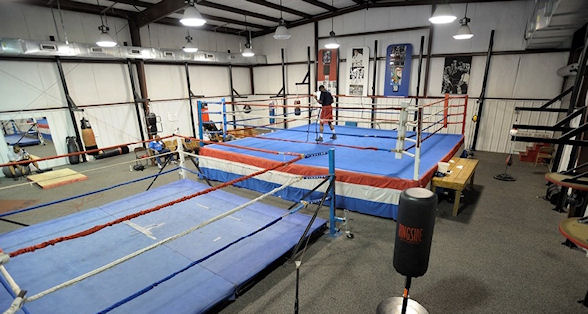
The George Foreman Youth and Community Center
AWS: Your fight record stands for itself: 76 wins with an incredible 68 knockouts, and just five losses in your entire professional career. Outside of the famous “Rumble in the Jungle” which you went into undefeated, which was the hardest loss to take?
GF: You know the only time I really felt I lost a boxing match was in Zaire in Africa when I lost to Muhammad Ali. He flat out beat me. The other bouts I don’t really consider them losses at all.
AWS: Why do you say that?
GF: Because I felt I won the boxing match. Well it’s hard to say I won it but I just felt like I didn’t get a knockout. I’d get in the ring with most everybody and knock them out but there were four other guys who went the distance with me and I didn’t knock them out. But I didn’t feel like I lost. Even at the end of that bout with Evander Holyfield, he was holding on for dear life. I felt like I won. Jimmy Young, I didn’t go to win on points, I went to get a knockout. I lost because I didn’t knock them out but they didn’t beat me. Tommy Morrison … these are the guys that ran and they held and stuff like that. Then the last boxing match I don’t felt I lost on poin
ts. But Muhammad flat out whipped me! The other guys, they want to put that on their records, good, but I only got whipped one time – and that was enough! (laughs)
AWS: You really feel that way – you didn’t lose to the other guys?
GF: No. They escaped being knocked out. But Muhammad Ali got me. Yeah, he got me.
AWS: You and Tyson are two extremes in life after boxing. There are two schools of thought on this – some say the boxing federations should fund a retirement scheme for boxers while the other says fighters make plenty of money along the way and it is their personal responsibility. What do you think?
GF: I think on both fronts you make a point. Some of us have been so fortunate and have made a lot of money so we should look after ourselves. But in the end, we are our brothers’ keeper and we should keep our brothers a lot better, especially in boxing. Basically boxing needs a good retirement benefit. Forget about how much money we’ve made, we should still be kept up because most of us are not that smart.
AWS: It doesn’t look good for the sport when a former champ falls on tough times.
GF: Yeah, when you fall on tough times you’re not only failing yourself, but the sport looks bad.
AWS: Can you tell us a little about your charity work and your life as a minister?
GF: When I left boxing, I became a full-time ordained minister at the Church of the Lord, Jesus Christ. That’s what I did, I never thought I’d become a preacher but I was for 10 years. Somewhere down the line I saw a lot of kids getting in trouble and I felt like, “I’m not going to get them to come to church. What am I going to do?” So I took some of my life savings with my brother Roy and we started the George Foreman Youth and Community Center, just to give kids a place to hang out, not necessarily to teach them boxing. Of course I knew how to box, so I put my old boxing ring in there with some weight lifting equipment. I dedicated myself to keeping kids out of trouble. And that’s what got me into trouble. I ran out of money. I couldn’t keep the center going. I had to go back to boxing for that cause.
AWS: How did you become a minister? What led you down that path?
GF: Well I was in Puerto Rico and I had this blinding experience. In a split second I was dead, then alive again. I saw blood on my skin and my forehead. I was in my dressing room and I started screaming, “Jesus Christ has come alive in me.” Everybody thought I was crazy and they rushed me to intensive care and put me there. And my life changed. I came back home. To smell death, you are never the same anymore. I didn’t think people really died. I don’t know what I had in mind. I should’ve really believed in religion, but I thought it was ignorant but then I left Puerto Rico with religion and started telling everybody about it. I was ordained in 1978 and to this day I’m still an ordained minister.
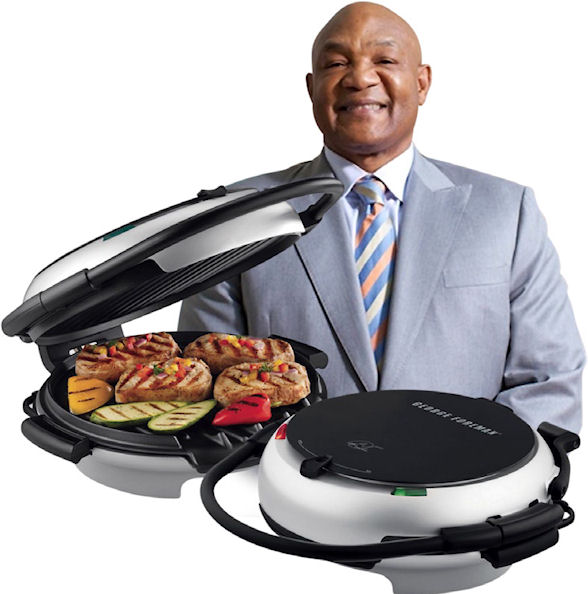
The hugely successful George Foreman Grill
AWS: The story of your religious experience in the dressing room after that 1977 fight in Puerto Rico against Jimmy Young is certainly amazing, and of course straight after that you retired the first time round. Let’s move on to life after boxing. The George Foreman Grill has been a massive commercial success said to be worth somewhere towards US$200 million to you personally. How did the George Foreman grill come about?
GF: Well I was a hit on Madison Avenue doing commercials for McDonalds, for Kentucky Fried Chicken … everyone wanted me and one friend said, “George, you’re making all these companies wealthy. Why don’t you get your own product and make yourself wealthy?” I said, “Sure, what can we find?” Finally we found this little item, and my wife tried it and told me it’s a great product. It made the meat all moist and juicy and gets the grease out. I knew that boxers need protein. So we did this joint venture and I got the lion’s share. We went out and promoted that thing 24/7 and we sold about 500 grills. I thought, “That’s all, that’s all we need to do”. Then we had sold 500,000. In the end we sold over 100 million of the George Foreman Grill. It started off as a laugh and a joke. I had no idea the success that grill would get me. I had no idea.
AWS: You have five sons all named George and even one daughter named Georgetta. Why did you name so many of your children George?
GF: Well if you are going to be hit by the likes of Joe Frazier, Muhammad Ali and Evander Holyfield you’d better make preparations for memory loss! (laughs) So I figured if I name all of them George, I will never forget a name.
AWS: That’s a funny answer, but it does bring a serious question. A lot of people talk about the effects of boxing. Ali and many other boxers have suffered health problems later in life. Then others, such as you, don’t. What are your thoughts?
GF: Well there are a lot of advantages from boxing although it’s not for everyone. Without boxing my life would have been absolutely different. Boxing can be made safer. I look forward to the day when the advent of headgear will come in. You can’t be too safe in boxing.
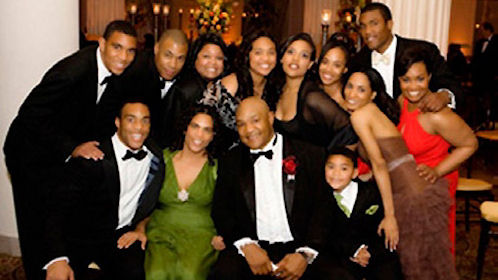
Foreman and his 12 children
AWS: Finally, what do you do these days? What’s an ordinary day in the life of George Foreman?
GF: You know I have eight grandkids. That keeps me busy. Of course I spend some time following my wife around. She’s telling me don’t do this, don’t do that. I raise German Shepherd dogs and I love horses and I work and I find money for my George Foreman Youth Center – that takes up a lot of time. I spend too much time doing things, I need rest! (laughs)
AWS: Mr Foreman, thank you so much for your time, it’s been a delight to speak to you.
GF: Thank you. (Smiles broadly)

